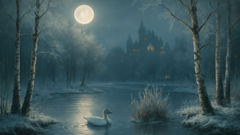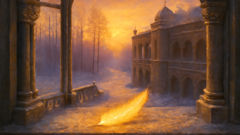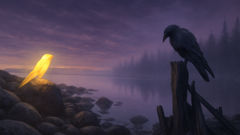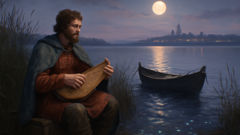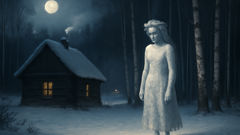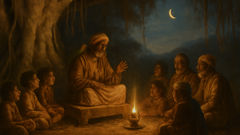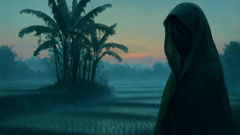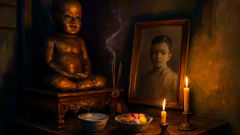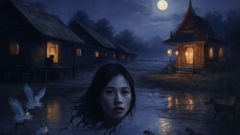Introduction
At the edge of a wide Russian river, where birch trunks stood like bone-white sentinels and reeds whispered old songs to the water, there was a kingdom whose name only the wind would remember. Snow settled early and stayed late, and for half the year the land seemed dreamlike, as if frozen in the pause between one breath and another. In that kingdom a prince grew up reading chipped icons and listening to tales that smelled faintly of tar and salted bread: stories of clever foxes, of impossible quests across nine kingdoms, of old women who were not always what they seemed. He learned to ride over thawing ruts, to read the sky for weather and omen, and to keep a certain stubborn patience in his heart. Near the palace, in a garden that clung to life like a secret, lived a princess whose laugh could thaw stone. She braided hair with ribbons the color of a late-summer sky and wore simple gowns embroidered with sprigs of rosemary and rue. Word of her kindness spread in bread crumbs and small favors, until even the lowliest miller took to whispering her name when the night was long.
But not all who listen to such whispers are pleased. Beyond the last cultivated field and across a stand of ancient pines there sat a crooked hut whose fence was made of bones and silver bells. It belonged to a witch who kept her face folded like a map of mischief. She had once loved what the princess possessed — the light, the easy laughter, the open hands — and found that time, and a growing hunger for power, had calcified that feeling into envy. So she turned to old rites, to the east winds that carry names of the dead, and to jars of moonwater and crow feather. On a night when the moon hung like a coin over the birch tops, she walked into the palace garden and, with a phrase half moss and half iron, struck the princess. The girl shrank and reformed feathers and bone until all that remained of her human shape was a small, pale duck with eyes clear as glass. The witch carried her away to a frozen pond at the forest’s heart, and the palace woke as if from one long pleasant dream.
News travels like smoke in those parts: it finds the hungry and the humble, the curious and the cruel. The prince heard the tale by a hearth where a traveling tinker told of a white duck that circled a hidden island under a pale moon. He recognized the way the tinker paused over certain words, the way the light fell wrong on his cup—subtleties a man teaches himself to see. And, because the heart remembers whose face warmed it first, the prince went outside beneath a sky where winter had not yet finished its work. He vowed — not in a loud way but as one lays a stone on an already long path — to find the duck, to learn the name she had lost, and to set her walking again as a woman among people. This is a tale of that search: of forests that close and open like hands, of riddles offered by river spirits, of an old witch's jealousy and the stubborn, slow love that refuses to yield.
The Witch and the Curse
The witch's name was spoken rarely, and when it was spoken it felt like the scraping of a needle across old parchment. Some called her Baba Kostroma for the way she harvested winters from other people's hearths; others muttered simply 'the one who lives beyond the birch'. She had lived in that crooked hut since the last war, and if you pressed an old woman from the village she would tell you that the witch used to be a midwife with a tender hand, until something inside her hardened like bread left too long in the oven. Pain and want had a way of doing that. What remained was cunning and an appetite for influence. When she saw the princess — not for her beauty alone but for the way the villagers lined up to lay small trusts at her feet — she felt an ache that could be named only by twisting the clean threads of another's life into knots.
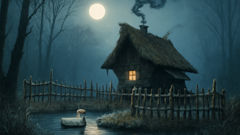
In the days that followed the curse, the palace was full of small thunder: servants who refused to speak of the garden at night; an old nurse who hummed notes she had never hummed before; a gardener who found a feather on the stair and burned it with hands that trembled. Rumors become rope; rope can be thrown into wells and used to pull up lost things. The prince listened to the rope of rumor unspool from every mouth that spoke. He followed the tinker’s story to a pond whose existence seemed half-remembered by the land itself. The pond lay in a hollow the older trees had long agreed to keep quiet about; its water was not quick but thoughtful, carrying on its surface the reflections of both moon and caution. The duck he found was white as the underside of a cloud and quieter than a question. When he approached, it did not flee but circled and watched with eyes that knew more than could fit within a duck’s small skull. There was intelligence there, and a sadness that the winter could not freeze out.
At the edge of that pond were marks of something unnatural: half-rotted herbs arranged in the pattern of an old charm, a ring of pebbles that, if you walked their line, made the air feel like a drawn string. The prince, who had been given as many pieces of advice as a boy as one could hold — from how to saddle a fast horse to how to read a map drawn on a napkin — had also been taught the old songs that keep the night honest. He sang a few of those songs beside the pond, and the duck tilted its head in a way that was almost human. A voice no bigger than the wind moved between them: "I am bound until the witch’s name is spoken falsely and then named rightly." The prince remembered a thing his nurse had once whispered while stitching a hem: that spells in the old country are made strong by falsehood as much as by truth; they cling to the lie until the honest word splits them like ice under a spring sun.
The witch, when she learned the prince had found the duck, answered in the creek of wind that sings through the eaves. She sent a fox one night, a cunning creature with eyes like pennies, to come to the palace and tell the prince a lie. "If you break the witch's house and burn the bone fence," the fox said, "all who were hurt will be set free by the noisy ruin. Take a sword and break things; make a clean fire and change the balance of power." But the prince had learned to see that not every plan offered by an animal of the wood was plain; animals can carry a witch's intent the way a seed carries the potential for an entire orchard. He thanked the fox and kept walking. He needed not force but a name. That was the crux: in many old rites one can unmake a knot only by calling the knot's woven parts by the names they once had. The prince thought of asking what the witch had used to call the princess when she was small; he thought of asking the duck its childhood songs. He listened to the reeds for a clue.
One morning, an old woman from the village — a weaver mostly forgotten by the palace but remembered by the hedgerows — came with a wooden box wrapped in linen. She had once been dismissed by the witch for refusing to use herbs to make others obey. Now she came with contraband: a mirror with a silver backing muddied by time, a thimble that had been bent and used on saints’ vestments, and a tiny comb carved from the bone of a carp. "These are things that keep a body honest," she said, laying them on the prince's hand like a small inheritance. "The mirror will show the truth if you ask it well; the thimble will stitch the torn; the comb will find the tangle. But the name will not come from tools. It will come from listening." The prince took the gifts, and at night he placed the mirror on the ground by the pond and asked the duck to look. The duck looked into that small tarnished glass and for a moment its reflection changed: not feathers but hair, not webbed feet but curved ankles. The mirror cracked and in the seam there seemed to be a name, half-formed and bright like frost in a candle's glow. He learned then that a name might be hidden inside an object until the right hearing reveals it, and that the tools the old people keep are not mere knickknacks but keys for a locked country.
Rumors of an army of geese, of witches' bargains and bargains of saints, crept into the tale like frost into cloth. The prince continued his watch, listening to the wind and the small things that speak: frogs that remembered the first winter, reeds that hummed the melody of the princess's childhood lullaby. The witch threw obstacles: she raised a wind that turned paths back on themselves; she charmed the moon to slide a day late across the sky. Once, she left a trail of feathers so beautiful the prince almost followed it into a pit. But the prince learned from the old weaver to count not only the feathers but the spaces between them. Those spaces were where truth could hide. He collected them, one by one, until the way to the witch's hollow became not a path but a gentle unthreading of a tightened skein. And when at last he knew the name the mirror had whispered — a name that tasted of home and meadows — he kept it folded in his mouth like a promise, ready for the moment when he could speak it aloud and test whether words could really alter the weave of the world.
The Prince's Quest and the Breaking of the Spell
For a prince to go on a quest is to say yes to being unwritten for a while. He sheds the neat lines of court life — the embroidered doublets, the predictable offices — and steps into a world where stories are graded by how wide a danger they carry, and by how stubborn a heart remains. The prince left one night cloaked in a coat his mother had embroidered with a single forget-me-not. Soldiers asked for his papers and were brushed aside by his purpose; only his oldest friend, a stable boy named Ilya, came with him across the outer meadow and then returned, because a prince cannot be reared of two loyalties at once. The prince rode a horse that remembered easier roads, and he walked where roads forgot to be. He crossed a field where the snow had melted into mirrors and where geese took up temporary thrones on stones; he waded through a marsh where reeds sang of lovers who had once lost each other. Each place gave him a riddle or a favor in the fashion of old stories.
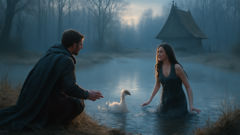
In that tradition, helpers arrive: a fox who owed him a favor because the prince, years ago, had tended the animal's hidden kit; a river spirit who asked him to untangle a net from the water and, in return, pointed to a bridge that was only visible when the moon was full; and a woman who lived in a hollow tree and spun tales that could be used like thread. One night, after the fox led him to a cave where the stars seemed to have crashed and left a light that hummed, the prince found an old soldier sleeping on a pile of furs. The soldier woke and smiled without showing his teeth. "Many have come for a white duck and left with the feathers of other men," he said. "You must ask not only for the name but for permission to mend what the witch has torn. The witch's covenant binds the princess because she feared a certain humiliation; to unbind it, you must offer a change the witch will not expect. She desires to be seen, not hidden; to be feared, not to stay empty. If you can offer her being seen in a way that takes away her hunger, she might loosen her hold." This was a lesson the prince had not known how to hear until now. He realized his task would not be a simple rescue; he must also find a manner of mercy for the witch, or at least a rebuke so fitting that her envy would break like glass under a familiar stone.
The prince traveled to the north where the birch trees became more frequent than houses and found a woman who spun light into rope. Her hands were quick and her eyes slow. She taught him the old tongue used by birds and water to speak to one another. "To call back what was stolen you must do three things," she said while her fingers moved as if arranging memories. "You must give something of worth without the thought of return; you must name the thing truly; and you must promise to keep what returns, come sun or frost. You will be tested by each of these steps and fail if you try to make the tests work as shortcuts." The prince, who had learned to be patient by letting winter take a season and then surrendering to spring, did as instructed. He gave his cloak to a beggar who had only rags and a memory of music. He crossed the ink-sky back to the pond and placed the cloak on the white duck's shoulders while the moon sailed as witness. The duck shivered and for an instant the cloak fit like a memory of shoulder — the human shoulders the duck had once had.
Next, the naming. The prince had carried the mirror's fractured syllable like a pebble in his mouth. Now he put it on his tongue and let the syllable shape against his teeth. Names in the old country are heavy things; they sink into the mouth like a ripe fruit and must be handled with care. He had to say the name not as accusation but as invitation. When the moment arrived he stood on the tiny island of reeds, the pond whispering at his feet, and addressed the duck. He did not demand she be a woman again; rather he said the name the mirror had given — a name that tasted of birch sap and of childhood songs. The duck's head lifted. From somewhere, the witch's anger came like thunder, and with it a wind that tried to make the prince trip over his own vow. He steadied himself and repeated the name, wrapping it in a promise: that if the princess returned, he would hold her freely and would not keep her to the brand of ownership. He vowed to protect and not to possess.
The witch came at last, not as the crooked woman many expected but as a hollowed statue of rain and old regret, her voice the clack of dried twigs. She demanded the prince choose between the duck and his promise. The test was cruel and precise: somewhere in the old magic, the witch had arranged that if the prince betrayed the vow even with a thought, the princess would remain a bird and his life would be colder for it. The prince remembered the faces that had taught him mercy: his nurse, the weaver, the old soldier who hadn't died but who'd weathered. He thought of the princess's laugh that thawed stone, and instead of trying to outwit the witch he offered a different answer. He did not placate nor did he provoke. He spoke to the witch of her embers. He named the loneliness he had seen in her eyes in the market when she bought a single beet and pretended not to notice the pity of the baker. He acknowledged the hurt that had turned to hunger. The witch recoiled as if struck by sunlight, surprised that anyone would say aloud the small, ugly cost of her years. In that instant, shame — a small and human thing — crept into her like a thread.
And then the quietest miracle: the spell faltered not so much because the prince had spoken the name — though that was necessary — but because he had offered the witch an honesty she had never been allowed. Spells woven on envy are strengthened by silence; speaking the truth of why one envies can sometimes undo the knot. The duck shook, and feathers fell like pieces of a white storm. Bone shifted; furrowed skin smoothed. Where feathers had been, pale skin and hair emerged. The princess stood wet and human upon the island, laughing at first like one who cannot yet own the sound she is making, then crying as memory and limbs returned. The witch covered her face and for the first time in many years let herself be recognized as a person who had become something else. It did not fix her in one breath. Some injuries carry back-splinters that require a season to remove. But the heart of the question had been answered: the princess would walk again among people, and the prince would not make of her a prize but a companion.
They left the pond toward the palace with the witch in the hush of that new morning. Villagers met them with baskets and with hands that had been waiting for this small miracle, and the palace heard the news as if it were a bell. Weddings are often the last chapter in such tales, but this story needed something softer than an immediate triumph. The witch remained at the edge of the village for a while, and some nights the prince and the princess would see her moving through the market alley with a slow cart of chestnuts, doing small repairs and being seen. The prince kept his promise: when the princess asked him whether she should sit by the pale pond that winter, he said she could go where she pleased, and he would come with her if she wanted company. She went once and fed the ducks, and the white duck — who had been the princess — swam among them with a certain satisfaction. People remembered the tale because it had the things stories like to keep: fear and hope, loss and redress, a moment where a stubborn heart met a hardened one and they both changed. But the detail the villagers remembered longest was how the prince had learned to listen, and how the witch, finally shown her reflection, began to unlearn a hunger that had been fed too long.
Time, as it always does, moved on. Seasons layered over the kingdom like quilts. The prince and princess lived in a way that respected the strange economy of vows and the humility of mercy. The palace curtains let in sun and storm without pretence. And sometimes, when moonlight skims the birch and the pond holds its own mirror, a white duck still circles the island. Villagers say it is a hint, a soft echo of what they once had and what they had nearly lost — a small reminder that the world tends toward rightness when people remember to listen, to name, and to keep the promises they make.
Conclusion
This story, like many told along the riverbanks and in the dim warmth of kitchen hearths, carries a lesson that tastes of rye and old milk: true courage is often small and steady rather than loud; it is the willingness to hear an unpretty truth and to keep a promise in a world that will gladly offer urgency over patience. In telling of the princess who became a white duck and of the prince who crossed frozen meadows to call her name, the tale asks its listeners to notice the edges of their own resentments, to imagine mercy even for those who have become cruel, and to understand that some knots are loosened not by force but by being recognized. It is a cultural echo of the Russian nights when stories light the cold, a reminder that humans are both fragile and stubbornly kind, and that sometimes the only path to undoing a witch's work is the slow, resolute work of listening, naming, and keeping faith with what we love. When the birches shed their leaves next autumn and the pond is only memory of summer light, the villagers will still speak of the white duck — and when they do, they will speak of a promise kept.

